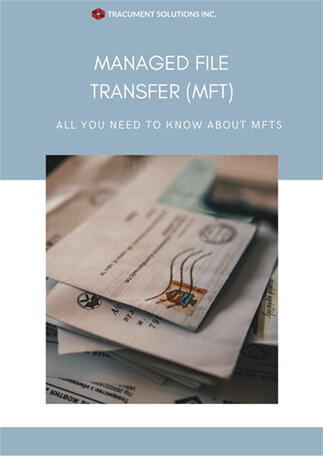
What is a Managed File Transfer (MFT)?
Managed File Transfer (MFT) is a secure file transfer service that helps organizations send files safely and efficiently over the internet. These software solutions are built to securely manage data exchanges, regardless of size and format. Without MFT software, all data, which can include project reports, patient/client/employee information, and contracts, risk being subject to a data breach, manipulated, or lost.
Whether you're a financial advisor, legal counsel, healthcare practitioner, or any other professional entrusted with confidential information, the necessity for a secure file transfer solution cannot be overstated. Your organization should have an appropriate solution.
Here are some key advantages of utilizing Managed File Transfer (MFT):
-
Security
Data breaches and failed file transfers can impact both an organization's bottom line and reputation. MFT solutions such as IBM Sterling, Tracument, GoAnywhere MFT, offer features like end-to-end encryption, secure authentication mechanisms, and more. This makes MFT ideal for handling sensitive, confidential, or regulated data, ensuring that information remains secure during transit. According to Harvard / Western Insurance, there were 70,000 reported cybersecurity incidents in 2023, which was an increase of 25% from the previous year. It is the organization's responsibility to be proactive in protecting any sensitive information.
We discuss this further in the next blog post, where we will be going through the technical aspects of an MFT, what kind of secure measures an MFT usually uses and compare standard File Transfer Services (FTS) to an MFT solution.
-
Data Size/Type
MFTs offer scalable solutions that accommodate growing data volumes and complex transfer requirements smoothly. As files may grow more complex each year, they also tend to increase in size. While many basic file transfer solutions can handle certain types and sizes of files, they often fall short when it comes to others. This limitation can restrict the operational capabilities of businesses, particularly those like law firms and medical offices, where managing a wide range of document types and sizes is critical for efficiency and compliance.
-
Regulatory Compliance
To ensure compliance with stringent security and privacy standards, these solutions come equipped with file tracking and logging capabilities. These features are essential for compliance with Canadian regulations like PIPEDA (Personal Information Protection and Electronic Documents Act) and Ontario's PHIPA (Personal Health Information Protection Act), ensuring data is handled securely in line with legal privacy and security requirements.
-
Streamlined Workflow
By automating file transfer processes, MFT solutions reduce the need for manual intervention and minimize errors. This automation not only speeds up operations, but also allows employees to focus on more important tasks. Manual processes or using basic file transfer services for transferring multiple files or large file sizes can be time-consuming and error-prone. Employees often spend a significant amount of time managing these transfers manually, which can lead to delays.
The adoption of MFT solutions emerges as an imperative choice that Canadian professionals must make, especially when entrusted with sensitive information. By implementing these solutions, professionals can navigate regulatory complexities, foster trust with clients, mitigate cyber threats, and uphold the highest standards of confidentiality. Ultimately, adopting a secure file transfer solution is a proactive step towards maintaining the integrity of sensitive information, enhancing operational efficiency, and building a reputable and trustworthy organization. If you're interested in learning more about Tracument's version of managed file transfer, which has helped hundreds of organizations deliver documents securely, find out more here!
You may also like
Happy Holidays Message from David Swadden, CEO
December 18, 2025
We would like to wish all our clients and readers a wonderful holiday season filled with joy and laughter.
Tracument Holiday Schedule
December 11, 2025
We would like to update all our clients of our Holiday Schedule this holiday season!
Tracument Wrapped!
December 4, 2025
What 2025 Looked like for Tracument and for you!




